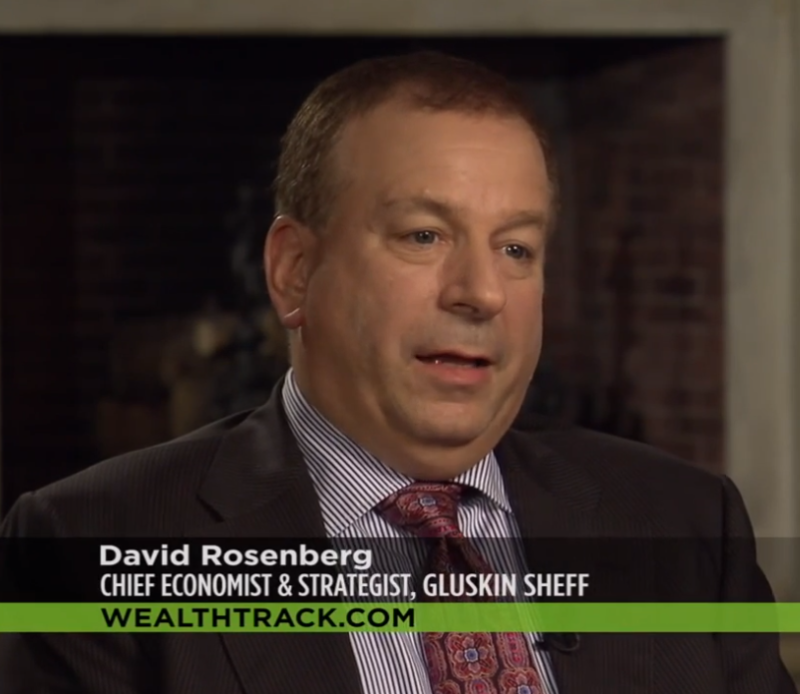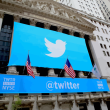Financial Thought Leader David Rosenberg is predicting a generational investment shift. The influential Chief Economist and Strategist at Toronto-based wealth management firm Gluskin Sheff recently reversed course on his long standing deflation and bullish bond theme. He believes Federal Reserve Chairman Ben Bernanke’s fight against deflation is working and that we are already seeing signs of inflation emerging and the economy strengthening beyond what most on Wall Street expect. He explains his new call and why investors should be making some proactive changes to their portfolios now.
Full Transcript Below:
CONSUELO MACK: This week on WealthTrack, with the power of the Federal Reserve behind it, Gluskin Sheff’s influential economist, David Rosenberg predicts inflation is coming. What his big call means for investors is next on Consuelo Mack WealthTrack.
Hello and welcome to this edition of WealthTrack, I’m Consuelo Mack. What has been one of the defining financial trends of the last three decades? We have covered it numerous times on WealthTrack, and no it’s not government shutdowns, although there have been 18 of them since 1977, including the most recent one. And it’s not the looming October 17th deadline for the federal debt ceiling limit. Congress has raised the debt limit 15 times in the last decade alone. Probably the most significant economic development of the last 30 years has been the submission of inflation and the concomitant decline in interest rates.
For that we can thank former Federal Reserve Chairman Paul Volcker who took office in 1979 when inflation had become a defining and destructive force in the economy. In the 1970’s the consumer price index was regularly increasing at 10% a year. Volcker waged war against inflation by tightening monetary policy, including raising interest rates and the economy went into what was at the time the deepest recession since the Great Depression. It worked. Over the 80’s and 90’s and into this decade inflation has declined and so have interest rates. But ever since the financial crisis, current Fed Chairman Ben Bernanke has been waging his own war in the opposite direction. He has been fighting against deflation and keeping interest rates low to reflate the economy. How effective will his campaign be? Very effective, according to this week’s guest.
He is Financial Thought Leader David Rosenberg, who recently reversed course on his long standing deflation and bullish bond theme and now predicts inflation will return and interest rates will rise which would eventually mean a whole new ball game for investors. Rosenberg is the influential chief economist and strategist for Toronto-based wealth management firm Gluskin Sheff. His daily “Breakfast with Dave” report is considered must reading by many institutional investors. In his 7 years as Chief North American Economist at Bank of America-Merrill Lynch, he was consistently ranked as an All-Star analyst by Institutional Investor magazine.
I began the interview by asking Rosenberg to explain his new inflation and interest rate outlook and tell us what’s changed.
DAVID ROSENBERG: Well, there’s a few things that have changed. The first thing I would point to is Fed policy. When this secular bull market in bonds began in 1981, we had inflation at 15%; we had bond deals at 15%. Everybody had this well-entrenched inflation psychology, and what people underestimated was this certain individual named Paul Volcker, who took on the role as the head of the Fed, and everybody underestimated his radical anti-inflationary resolve. And it took him five years. It didn’t happen overnight. It took five years and two recessions to finally expunge those inflationary accesses, and the inflationary mentality that we had back then. So you fast forward 30 years, and—
CONSUELO MACK: And it worked, incidentally.
DAVID ROSENBERG: Well, maybe it worked too well for this current Fed. But what do we have now? We had very recently bond deals, one-and-a-half percent, inflation, one-and-a-half percent, but, you see, we don’t have Paul Volcker, we have Ben Bernanke, probably followed by Janet Yellen. And we have the most radical pro-reflationary monetary policy in modern history. So I’m going to operate under the assumption that the Fed is going to get what it wants, and then some, because that’s the way that it’s always worked in the past. There’s just lags. It took Volcker quite a long time to kill inflation. I think that with the lag, and the lags are already through the system, the Fed will kill this perceived disinflation or deflationary scare over the course of the past several years.
What was very interesting to me is that when you go to last December, the Fed put in its press statement, and they’ve held to this press statement ever since, that they would be willing to tolerate inflation expectations up to two-and-a-half percent. So I’m not talking about five percent, or seven percent, but two-and-a-half percent, but you see, two-and-a-half percent is not price stability. It was just five, six years ago where the people at the Fed were deciding whether or not price stability is one percent underlying inflation. They used to think it was two percent. Now they’re saying two-and-a-half. And that’s something new, because two-and-a-half percent, the price level doubles every 30 years. So the question you have to ask yourself, from a fixed-income perspective, from somebody like myself, who had been very bullish on long-term bonds for a long period of time…
CONSUELO MACK: Right. And correctly so, I might add.
DAVID ROSENBERG: Well, you know, bond yields are not four, five, six percent right now. They’re basically around, call it, you know, 2.6 percent. Why on earth would you want to own a 2.6 percent coupon on a ten-year Treasury note, and earn practically no premium over inflation whatsoever, under the proviso that the Fed ultimately gets what it wants, which is two-and-a-half inflation.
CONSUELO MACK: So what are the chances, what could prove you wrong? We have stubbornly high unemployment. We have China slowing. We have a lot of Europe in a recession. We have tightening in the emerging markets, like Brazil, and India, and Indonesia. So what is it that’s going to bring inflation back?
DAVID ROSENBERG: Well, you know, we had fairly weak economic growth in the 1970s. In fact, within a span of what, a decade, we had three recessions, and inflation stayed stubbornly high. And by the way, I’m not talking about going back to the seventies.
CONSUELO MACK: Not 15% inflation.
DAVID ROSENBERG: Consuelo, I will tell you, we’re not going to go back and wear bell-bottom jeans, and we’re not going to go back and listen to disco music.
CONSUELO MACK: Darn.
DAVID ROSENBERG: At least, hopefully. But I think we’re going to have a mild form of stagflation. So here’s what I’m looking at. Yes, growth is not very strong, although we’ve had the mother of all fiscal restraints this year between the tax hikes and the sequestering. That’s taken about a percentage point-and-a-half out of GDP growth.
CONSUELO MACK: So it would have been higher, were it not for those factors.
DAVID ROSENBERG: Yeah. When you tack on everything else, we would be close to three percent. So there’s only been two other years in the past, actually, where fiscal policy had tightened to the degree that it has this year. Both those years landed the economy in a recession, and we’re not in a recession, but growth is weak. I think it’s going to get better next year. As the fiscal headwinds subside, my hope, my hope is not a prayer, it’s a hope, is that the European recession is behind us. I’m not factoring in a big recovery there, but I think next year is going to be better. And what I find fascinating, and I would say maybe even a little disturbing, to some extent, is how is it that just 1.6 percent real GDP growth in the past year could take the unemployment rate down from 8.1 to just barely over seven percent right now?
CONSUELO MACK: People dropping out of the labor force, or a shrinking pool of labor? Could that do it?
DAVID ROSENBERG: Well, if you take a look at every single measure of unemployment, that we even take that into account, the unemployment rate has come down, with just 1.6 percent GDP growth. During the very strong capital formation years of the 1980s, 1990s, even in the 2000s, if you got 1.6 percent GDP growth, the unemployment rate went up. It didn’t come down. So that’s telling me something about what economists would call the non-inflationary speed potential of the U.S. economy. It used to be during the Greenspan era, when we had tremendous rates of growth and capital formation, tremendous productivity, the economy could go four percent, and not generate much in the way of any inflation. It wouldn’t drain the resources out of the labor market. So I find that very fascinating that such weak growth can drain resources out of the labor market as much as it has.
So here’s what’s happened. In the past five years we have gone through the weakest pace of capital formation in the private sector at any other point in the past six decades…
CONSUELO MACK: Wow.
DAVID ROSENBERG: …with a lag, and I was waiting for this, and it’s filtered into productivity growth, which, as we sit, is sitting at 0.0 percent. There’s no productivity growth. So companies are having to go increasingly into the labor market right now to tap the labor market, to fill their order books, to fill their production. Now, employment is not going gangbusters, because growth is fairly slow, but what happens next year if we get towards three percent growth, productivity growth is zero? You’re going to tap more labor. We’re not talking about 165,000, 175,000 on payrolls. We’ll be up to 250, 260, 270.
CONSUELO MACK: This is per month, you’re talking about…
DAVID ROSENBERG: Right.
CONSUELO MACK: …is what you anticipate.
DAVID ROSENBERG: And the unemployment will come down even further. And yeah, the unemployment rate is high, but it is coming down. And with the lag, it will be a wage response. And 70% of the inflation process is wages. So just think about zero productivity growth, wages going up. That means unit labor costs are going to be accelerating, and that trend, by the way, is already in place.
CONSUELO MACK: So what’s interesting about this is, because one of the things that, of course, a lot of economists have been looking at, as well as government officials have been, is the fact that wages have not increased, and that there’s the widening gap between the wealthy and the middle class, and the middle class has not made any gains, as far as wages are concerned, and compensation. So you think that that’s going to change? Which would be a positive, right, for…
DAVID ROSENBERG: Absolutely.
CONSUELO MACK: …workers and the average American.
DAVID ROSENBERG: I fully agree.
CONSUELO MACK: So this is not going to be a forever. This is not a new economy. In fact, we are going to see some improvement.
DAVID ROSENBERG: Why on earth can anybody resist a forecast like that? You know economists… so everything you’re telling me… I mean I’ve been in this business for 30 years, and economists have a tendency to take the most recent experience, and extrapolate it in the future.
CONSUELO MACK: As do investors.
DAVID ROSENBERG: And that’s not a proper way to forecast. You have to have a forecast. You have to be able to read the tea leaves, understand how the markets are shifting, understand that t here’s lags involved. It’s not as if the unemployment comes down to time X and then a time Y, which is next week, you start seeing the wage response. It will take time.
But yes, my premise is that the labor market operates like any other market, and that as capacity is drained out of the labor market, and you’re seeing… look where jobless claims are right now. They’re down to 300,000. Companies are hoarding labor. The number of firings has come way down. Jobless claims are telling you that. We haven’t had a normal hiring cycle. If you ever get anything close to a normal hiring cycle with where the level of firings are right now, employment is going to pick up dramatically. And it would be very strange, indeed, to have the resources drawn out of the labor market, and not have the price response. And the price response will be in the form of higher wages.
I find it very interesting that, you take a look at this cycle, companies have tremendous cash, there are competing demands for that cash, you know, dividend payouts, a nice story for the stock market, stock buybacks, nice story for investors, but yet, they haven’t had to pay their working class. But I think that we are going to see a shift in that direction.
How great would it be- again, if you want to go back to GDP, which is the aggregate demand curve, which is about spending- how great would it be to have a situation where part of the economy, called the corporate sector, which has a 40% savings rate, because they’re hoarding the cash, ends up sharing those spoils with the part of the economy called the consumer sector, which only has a four percent savings rate. So that’s going to be, I think, a trigger point for another leg in the economic cycle, but my premise here is that productivity growth is going to remain weak.
CONSUELO MACK: And if productivity growth is weak, that means that you’ve got to hire more people in order to… right.
DAVID ROSENBERG: And that’s exactly what’s happening.
CONSUELO MACK: To grow your business.
DAVID ROSENBERG: And it’s a slow process. You know, on top of that, then you have to run the correlations as to what drives the inflation process. On this particular topic we’re talking about supply side economics. Unit labor costs, which is productivity-adjusted wages, has a time (inaudible) 85% correlation to inflation. Now, economists will say, well, you know, correlation is not like causation, but I think in this case it probably makes sense, because wages are such a critical part of overall business expenses. But this is a story of zero productivity growth, to me, is not a deflationary statistic. When it’s coupled with a tightening labor market… and admittedly, the unemployment rate is high, but it’s coming down. And every measure of labor utilization is coming down. I can understand that the Fed is still concerned about the economy not being where they thought it was going to be, and I’m sure that we’ll get into that, but I think that the labor market is going to be a fundamentally positive story next year. And when I go with this story to investors and to other very smart people, it’s met with derision. And that actually emboldens me, because it reminds me of when I was making my negative call on housing, which I took no pleasure in doing, by the way, but when I did that in 2006, when I was at Merrill Lynch…
CONSUELO MACK: No one believed you.
DAVID ROSENBERG: …it was the same derision. So actually, it’s one of these things where… you know, again, Bob Farrell, rule number nine, when all the forecasts and experts agree, something else is going to happen. And that’s what I’m talking about. In 1981, the inflation psychology was so well entrenched, we’re never going to get rid of inflation. Well, we did. And now, we’re never going to get rid of the deflation. We’re never going to get rid of this unemployment problem.
You know, there is something very interesting, the dynamic of the labor market that’s very interesting. We have today a real bifurcated labor market. I guess everything’s almost bifurcated today. Ninety million American adults reside outside the confines of the traditional labor force, defined…
CONSUELO MACK: 90 million?
DAVID ROSENBERG: 90 million. That number is up, since the recession ended, by 10 million. And so, you know, are these kids, who went to university, going back to live with mom and dad. You know, they figure out mom’s cooking is pretty good after all. She does the laundry. So maybe they’ll stick around longer. But maybe that comes true with the fact that the youth have very challenging job prospects, the student loan problem, so on and so forth.
CONSUELO MACK: Also, unemployment benefits were extended. I mean there are all sorts of things, right, that allow you to be unemployed for longer.
DAVID ROSENBERG: Two years of unemployment insurance, you know, which would make Fisherman and Newfoundland blush. You’ve got widespread benefits. The Cato Institute did a report recently and found that in 39 states, if you tap all the benefits available at the state level and the federal level, that you can actually be without a job, and make the same amount of money as a secretary. In 11 states, you would actually make as much money as an English teacher. So there is work disincentives at play. That’s part of it as well.
But, you know, people talk about that the unemployment rate is going down for “the wrong reasons.” What does that mean, for the wrong reasons? We are creating jobs. Maybe we’re creating jobs at the pace that the economy can basically absorb at the current time, but this notion is yes, that the participation rate is down to a 35-year low. The question is: Why does that matter? The labor market is the labor market. And so we took 90 million people out. They’re outside labor force. It’s basically, if you’re talking about the airline industry, we’ve reduced capacity. Well, you know, that’s a big story. We’ve taken capacity out. The total pool of available workers is down to a four-year low. Companies are going to have to start tapping that. And it’s interesting- what are the jobless numbers telling… we’re down to 300,000, what are they telling you? Companies have already, in the past number of years, cut to the bone. Now they want to hang on to their staff, because what’s left behind in the labor force is the skilled staff. They want to hold onto that staff. They haven’t gone through a normal hiring cycle yet. I think that’s going to be the next part of the story. You take a look at the number of people that are voluntarily quitting their jobs.
CONSUELO MACK: So that’s now rising?
DAVID ROSENBERG: And that’s now rising. I call that the take this job and shove it index, and people are leaving their jobs, and they’re going to find another one. And so this is all going to factor into higher wages. And believe me, it’s not the end of the world. It’s actually a very positive story. The thing is that it’s met with such widespread disbelief.
CONSUELO MACK: So impact on the markets and impact on our investment strategy. So this would be a sea change that you’re talking about. So this is a generational shift that you’re talking about, right?
DAVID ROSENBERG: Right.
CONSUELO MACK: Of higher inflation, you know, more jobs. I mean it’s actually a positive for the economy, but what does it do to the markets?
DAVID ROSENBERG: Okay. Well, we’ve got two things, right? We’ve got the supply side, I talked about. I think the wage process. And then we’ve got the Fed. Okay? And the Fed, we have to make this…
CONSUELO MACK: The Fed is still fighting… the deflation war.
DAVID ROSENBERG: The Fed is fighting… and the Fed is always fighting the last war. They fought the inflation war. Now they’re fighting the deflation war. They’re fighting the last war. But the want to generate inflation. They’re telling you we want inflation up to two-and-a-half percent.
CONSUELO MACK: And employment.
DAVID ROSENBERG: And they want lower unemployment. Yeah. But the thing is that it was always about price stability. I’m trying to say that is no longer the case. They’re saying two-and-a-half percent, and then probably it’s going to be two-and-a-half percent plus something. And, again, it’s the way that the Federal Reserve is playing ball with the Treasury. Ben Bernanke gave this famous speech back in the spring of 2003, where he talked about one of the pitfalls in Japan was how the Bank of Japan and fiscal policymakers didn’t play ball with each other. When you think about what the Fed is doing, they are de facto monetizing the debt.
Creating inflation, what a surreptitious way of defaulting. It’s not a real default, but it’s you reflate your way out of your debts. So look at what happened to the cycle. We bailed out the banks. The big banks got even bigger. Deadbeat homeowners. Well, we had foreclosure moratorium for them. And now, we’re basically bailing out Uncle Sam fractionally, moderately, by sanctioning higher inflation. This is a different Fed policy than what we came to grips with over the past 30 years.
Back in the 1980s, and back even in the 1990s, I was talking to people that were around in the seventies. They were in the trading pits at the big banks. These were my constituents. And all they knew was inflation. All they knew was… and I said, so all you knew was inflation, you don’t… because you were just taking the previous economic condition that you grew up with, and you’re superimposing it on the future. Don’t do that. And today, I go and I take a look at the people in the markets, they are all these young pups, and they’ve only known, they’ve only known disinflation. They’ve only known now deflation. They’ve never seen inflation, because it’s been so long.
CONSUELO MACK: So new ballgame then for the markets. So what’s the impact going to be in the market? So my investment strategy of the last, what, 20 years is no longer going to be valid, right?
DAVID ROSENBERG: Well, there’s going to be winners and there’s going to be losers. We’re going to have a mild form, I would say, of stagflation. A mild form of stagflation. It’s not the 1970s, but it will be different. So how do you invest around that? Well, the Fed is going to keep short-term rates lower for longer. They told us that. As we’ve seen in the past few months, as powerful as the Fed is, sorry, they do not control the entire yield curve. They don’t control the entire bond market.
CONSUELO MACK: So long rates are going up.
DAVID ROSENBERG: Long rates will continue to drift higher. I mean, right now they’ll probably stay put, but over time long-term rates will drift up. The Fed will be very slow to raise short-term interest rates. Well, who benefits from a steeper yield curve are the banks, because they get wider net interest margins. Insurance companies, which got beaten up so badly by ever-declining interest rates, they’re going to be doing better.
CONSUELO MACK: So financials.
DAVID ROSENBERG: Financials will be a good place to be. I would say certainly better than the utilities and the other classic interest rate sensitives, but the banks will have wider net interest margins, so I think that’s going to be good for their business. What else? Well, let’s say that you want to have inflation hedges in there. I think down the road basic materials will be a good place to be.
CONSUELO MACK: You mean commodities?
DAVID ROSENBERG: Commodities.
CONSUELO MACK: Gold?
DAVID ROSENBERG: Yeah. They should do well in that sort of environment. I would say, you know, what about rising wages? What if we actually get to that Holy Grail? I mean people just don’t want to believe that we can actually get three percent growth next year, get employment on a more durable basis, rising. People don’t want to believe it. We haven’t seen it in quite a while, I guess. People forget that we can actually attain that condition.
CONSUELO MACK: So what investments benefit from rising wages? Obviously, consumers do and workers do. Right.
DAVID ROSENBERG: Bingo. So I would say, you know, consumer discretionary…
CONSUELO MACK: Retail?
DAVID ROSENBERG: …services. Well, you know, I’ll tell you what we’re doing. Retail would be… that’s the first reaction, but actually, we’re finding opportunities in consumer services.
CONSUELO MACK: Such as?
DAVID ROSENBERG: Well, entertainment, for example. Cable media. Those will be places that will be very interesting to us in this sort of environment of rising wages. And what do Americans love? Americans love entertainment. Cable media fits into that. I think that the next stage is going to be, look, at some point we’re going to have to do more in the business sector to replenish the capital stock. Like I said before, this has been the weakest period. This is not sustainable. So I think there’s going to be… you know, once businesses can see that there is visibility on the economy…
CONSUELO MACK: They’ll start spending on…
DAVID ROSENBERG: Yeah.
CONSUELO MACK: …equipment, software, you tell me.
DAVID ROSENBERG: If you want to protect your margins, you’re going to have to reinvest in your business. And so when I said before about competing challenges for the cash, well, a lot of it has gone towards dividends. I said before, stock buybacks. It hasn’t really gone to the real economy. We have moderately better employment growth. Clearly, not good enough. Not good enough for the Federal Reserve, but we haven’t really replaced the capital stock. So that’s going to be another stage of the cycle.
So whether you’re talking about hardware or software, you know … so first, it will come in the form of consumer services. Hardware, software is going to be a good place to be as well. And I would say that within the bond market, within the bond market, so long as we avert a recession, which I think we will, which means that default rates will remain low, I think if you’re going to be investing in bonds, I ‘d rather be in, say, corporate credit than in government credit.
CONSUELO MACK: All right. And SIRP- Safety and Income at a Reasonable Price, that’s been your investment mantra for, I don’t know, 20 years. So what’s happened to SIRP?
DAVID ROSENBERG: Well, SIRP has morphed into HIRP, which is Hedge Inflation, Risk Protection. So SIRP, it’s like saying goodbye to an old friend.
CONSUELO MACK: Right. No, it is. Okay. Safety and Income at a Reasonable Price is now HIRP. So tell me what that means again.
DAVID ROSENBERG: Well, that’s exactly what we were talking about, is about…
CONSUELO MACK: Hedging?
DAVID ROSENBERG: That’s right. You know, I would say, for example, one of our strategies is we are shorting government bonds, and buying corporate credit. Locking in those spreads. You are going to make money just shorting government bonds in a rising yield environment. I said before, the banks are good hedges to be. Insurance companies. And a play on hard assets. A play on hard assets. And that can include for some, it can include real estate. It can include commodities.
CONSUELO MACK: Hedge Inflation, Risk Protection. All right. One Investment for a long-term diversified portfolio, what would you have all of us own some of in a diversified portfolio?
DAVID ROSENBERG: Well, I think right now, one of our top themes is exactly what I was talking about before, which is what is the source of the inflation? The source of the inflation is coming under the labor market, higher wages. So we want to find those small luxuries that the American consumer, you know, wasn’t participating in over the past few years. So we are allocating more of our equity money into that particular part of the retail space, otherwise known as cable and media.
CONSUELO MACK: That’s considered to be a luxury, not Cartier, not…
DAVID ROSENBERG: I said small luxuries.
CONSUELO MACK: Small luxuries. All right. Dave Rosenberg, number one, thank you so much for being here on WealthTrack again. You’ve got a big audience out there. And also, thank you for sharing this big call that could be the change of a generation. So I appreciate your being here on WealthTrack.
DAVID ROSENBERG: Thank you again for inviting me.
CONSUELO MACK: At the close of every WealthTrack, we try to give you one suggestion to help you build and protect your wealth over the long term. Our Action Point is: consider David Rosenberg’s new HIRP investment theme, which stands for Hedge Inflation, Risk Protection.
Rosenberg is frequently early in spotting important turns in the economy and markets, but he is rarely wrong so it is worth making some small adjustments to your portfolio now. Adding some inflation hedges, such as the much vilified TIPS- Treasury Inflation Protected Securities- if you don’t already have them, is a good place to start.













